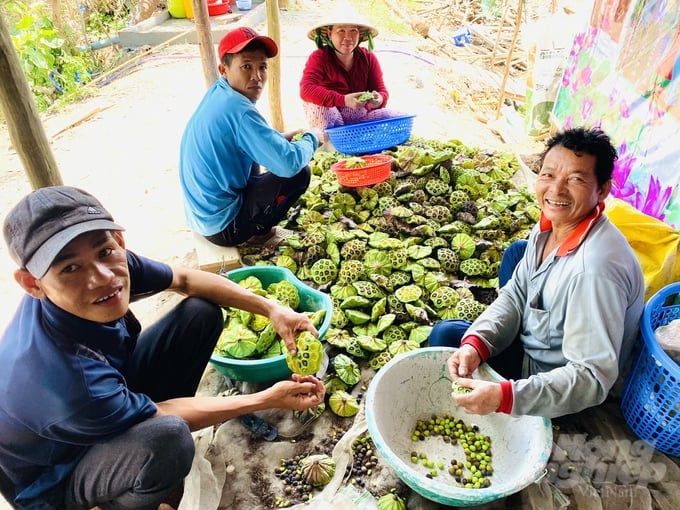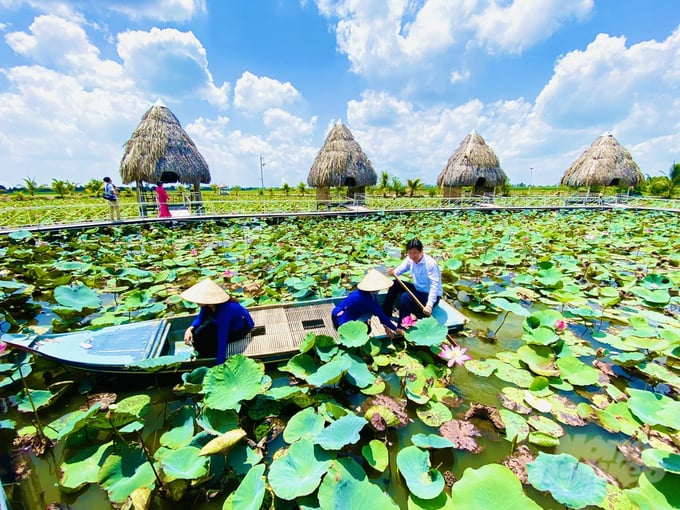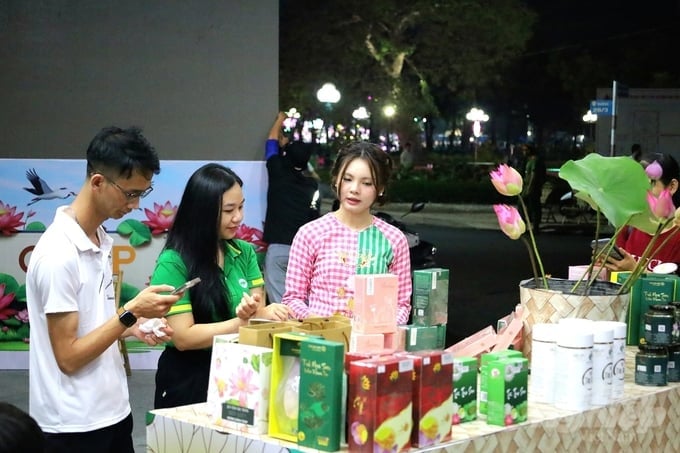May 20, 2025 | 09:39 GMT +7
May 20, 2025 | 09:39 GMT +7
Hotline: 0913.378.918
May 20, 2025 | 09:39 GMT +7
Hotline: 0913.378.918
As part of the series of events for the Second Dong Thap Lotus Festival in 2024, which will be held from May 16 to May 19, Dong Thap Provincial People's Committee and the Ho Chi Minh City University of Social Sciences and Humanities (under the Vietnam National University of Ho Chi Minh City) co-organized a scientific seminar titled "Dong Thap Lotus: Cultural Value - Enhancing International Integration".

Dong Thap farmers harvesting lotus seed pods. Photo: Le Hoang Vu.
Lotus is a key product in Dong Thap province's agricultural restructuring project. Furthermore, the local plant has been selected to represent the province, with the title: "Dong Thap - Land of the Pink Lotus."
The people of Dong Thap province have established lotuses as an integral aspect of their cultural traditions and everyday lives. In 2007, Dong Thap Provincial People's Committee introduced a provincial symbol featuring a stylized circular lotus flower. In 2015, Dong Thap issued the "Dong Thap Tourism Development Project 2015 - 2020," which included significant investment in developing Cao Lanh city in association with the image of the lotus.
Every year, Dong Thap hosts multiple cultural festivals to honor the value of the lotus industry, and promote the image of Dong Thap as the "Land of Lotus," "Lotus Capital," or "Land of the Pink Lotus."
Dong Thap province boasts over 1,800 hectares of lotus production areas, which span the districts of Thap Muoi, Cao Lanh, Chau Thanh, Tan Hong, and Tam Nong. Notably, Thap Muoi district accounts for more than 30% of the province's total lotus production area. On the other hand, Dong Thap province currently houses 30 processing businesses specializing in 120 lotus-based food and cosmetic products, and 200 lotus-based dishes and beverages.
Through the skilled craftsmanship and creative minds of the local people, various unique gift products with high artistic and aesthetic qualities have been created from the lotus plant, complemented by scientific and technological advancements. Some notable products include lotus leaf paintings, lotus silk, and premium lotus-infused tea.
Within the framework of the OCOP initiative, Dong Thap province has produced 59 lotus products with ratings of three stars or higher, including one five-star product.

Dong Thap province boasts over 1,800 hectares of lotus production area, which span the districts of Thap Muoi, Cao Lanh, Chau Thanh, Tan Hong, and Tam Nong. Photo: Le Hoang Vu.
According to Professor Phan Thi Thu Hien, Senior Lecturer at the Faculty of Cultural Studies, Ho Chi Minh City University of Social Sciences and Humanities, eco-tourism is the current primary focus for Dong Thap's tourism industry. However, the province has not fully utilized its natural and cultural resources; nor has it effectively connected eco-tourism with other local tourism models to promote cultural values and enhance the integration of lotus tourism.
In order to improve the effectiveness and appeal of lotus tourism in the future, Professor Hien proposed that Dong Thap adopts a 3D model approach, which includes expanding space, extending time, and elevating the lotus symbol. Professor Hien also suggested several key activities, including: developing a lotus-themed park; implementing solutions to extend the lotus season; enhancing the lotus symbol to promote cultural values and enhance the integration of lotus tourism; and promoting Dong Thap province's image and reputation.
In addition to short-term solutions, scientists have made several long-term proposals for the comprehensive planning and development of the lotus industry in Dong Thap.

Numerous valuable products and unique gift products with high artistic and aesthetic qualities have been created from the lotus plant. Photo: Le Hoang Vu.
During the seminar, participants presented various scientific and technological solutions to promote the sustainable development of the lotus industry. Accordingly, Dong Thap is in need of standardized lotus varieties for processing and export, along with development solutions for organic lotus farming. Additionally, one proposal called for the construction of a lotus complex as a foundation for developing Dong Thap into the lotus capital of Vietnam and the world.
According to Mr. Huynh Minh Tuan, Vice Chairman of Dong Thap Provincial People's Committee, the seminar allowed participants to fully recognize the cultural values of the lotus in relation to the land and people of Dong Thap. This recognition is essential for enhancing the international integration of Dong Thap lotus through economic and tourism development strategies. It will also provide a scientific basis for proposing policies and strategies to enhance the value of the lotus in the future.
Translated by Nguyen Hai Long

(VAN) World Environment Day 2025 (June 5) carries the theme 'Beat Plastic Pollution' continuing to emphasize the global urgency of addressing the plastic waste crisis.

(VAN) This was the assessment shared by experts at the workshop titled 'Assessing the Role and Potential of Low-Emission Rice Production Systems in Vietnam,' held on the morning of May 19.

(VAN) Cai Rong Port is the fisheries control center of Quang Ninh, helping to monitor fishing vessels, combat IUU fishing, and remove the EC's 'yellow card'.

(VAN) The German Agricultural Society (DLG) explores the possibility of establishing a mechanization service center in Vietnam’s Mekong Delta to support farmers in accessing and utilizing advanced machinery.

(VAN) On May 16, the Department of Water Resources Management, in collaboration with the Food and Agriculture Organization of the United Nations (FAO), held a signing ceremony for the GEF-8 project document.

(VAN) Food safety, mechanization, vocational training, and market opening are key areas of cooperation expected between the Vietnamese Government and the Federal Republic of Germany.

(VAN) Deputy Minister Nguyen Quoc Tri also expressed his hope that Cuba will soon overcome its current challenges, attain food security, and further expand cooperation with Vietnam.